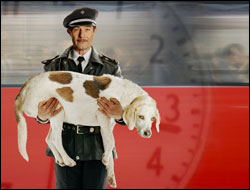Eddie is a chubby beardy bear of bloke living out in a big wood timbered farmhouse next to a lake with his young girlfriend Marie; far away from everyone and everything .”All i want is you” says she. “And i want you” says he. Cushty. Maria is up the duff.
But somebody is going to ruin this lovely life in a minute. Cue Kullman. He too wants some of what they want.
“You have a good life” says Kullman envious. “Want to play a game?” He gets them both to close their eyes. Boo! “You knew something horrible was going to happen. And then it did. That’s what makes it so terrible” says Kullman. Maria doesn’t want to play. She’s sussed his game.
After this I’m suspecting Kullman is going to be a menace in a psycho nutcase kind of way. And as if to confirm this suspicion he’s deliberately sliced his leg with a chainsaw to get to stay longer. She knows. Then neighbours dog is in boot of Kullmans car dead. Claims he ran over it. Next, a nearby barn is on fire.
“She’s too good for you” says Kullman to Eddie. And for a while Eddie goes a bit bonkers with jealous rage.
A distinct change has taken place: it’s Eddie – rather than Kullman – who is “ruining everything” stamping about and chucking tiles off the roof. His aggressive old thuggish self is jumping about, scaring Marie off. Kullman, by contrast, seems like a little boy lost, just wanting to belong, be accepted, be included; share in some of the good stuff Eddie has been having (living here in this rural idyll with the lovely Marie) The Bad Guy role has been subtly switched. Gradually, I’m feeling more sympathetically inclined towards Kullman – which i guess is what i was meant to feel.
At the end Eddie comes back to his cuddly -huggy baby- bear self again. Although he does give a metaphorical slap to Kullmans face: “You were never really a friend, not really“. And Kullman is left there, friendless, alone, unwanted, rejected. Yes, i did feel sorry for him.
Its a relief the film hasn’t got all silly with contrived thriller genre plotty twists and potty turns. It’s kept true to its melancholic undertow, mostly – stayed close to its quiet Norwegian roots.
Dir: Marius Holst, Norway,
6.5/10






